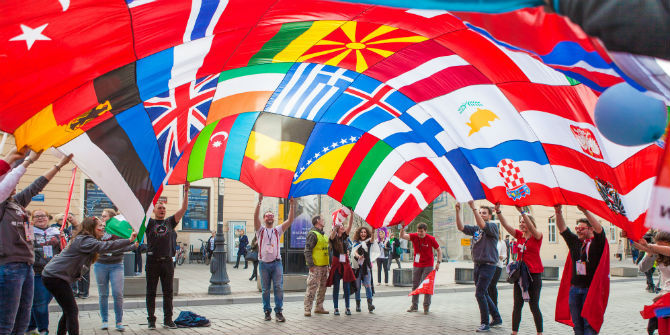 Around one in four LGBTQ Polish migrants in Britain say their sexuality was one of the reasons why they moved to the UK. Lukasz Szulc (University of Sheffield) describes how this group have reacted to Brexit and why most plan to stay in the UK despite the ramifications of the Leave vote.
Around one in four LGBTQ Polish migrants in Britain say their sexuality was one of the reasons why they moved to the UK. Lukasz Szulc (University of Sheffield) describes how this group have reacted to Brexit and why most plan to stay in the UK despite the ramifications of the Leave vote.
Polish migrants constitute the biggest overseas-born group in the UK, with numbers reaching 830,000 at the end of 2018. While they tend to be imagined as conservative, religious and homophobic, some of them are lesbian, gay, bisexual, trans or queer (LGBTQ). For them, Brexit ‘mixed up everything’, in the words of a Polish gay man living in London. Many moved to the UK to live more openly as an LGBTQ person, but they are now facing an increasingly anti-migrant climate in the aftermath of the Brexit referendum. At the same time, the prospects of moving back to Poland are rather bleak, taking into account that the ruling Law and Justice Party has attempted to shore up its support by taking a harsh line on LGBTQ issues in the run-up to the 2019 parliamentary elections.
Why did they move to the UK?

Results of a survey of nearly 800 Polish LGBTQs living in the UK, published in the report Queer #PolesinUK: Identity, Migration and Social Media, indicate that the most popular main reasons for migration for this group were related to work (31% of respondents), accompanying or joining partners, families or friends (17%) or LGBTQ issues (16%). Some have also moved primarily to study (10%).
Still, one in four respondents (27%) declared that LGBTQ issues were either the main or one of the reasons why they moved to the UK. Many of those respondents described Poland using such negative expressions as ‘homophobia’, ‘intolerance’ and ‘lack of acceptance’, while they characterised the UK as ‘tolerant’, ‘open’ and ‘free’. A 20-year-old lesbian who moved from Poland to the East Midlands in 2018 explained that her migration was motivated by ‘the possibility of leading a “normal” life (forming a family, getting married, having kids, being accepted)’. In Poland, same-sex couples are not legally recognised.
It would be unfair to depict Poland as ‘typically’ homophobic and the UK as ‘essentially’ tolerant towards LGBTQs. In fact, Poland had already decriminalised same-sex acts in 1932, 35 years before England and Wales. It is true, however, that in recent years the UK has embraced LGBTQ rights more enthusiastically than Poland, while the Law and Justice Party picked on LGBTQs after its win in the 2015 elections. This intensified anti-LGBTQ climate in Poland played a key role for some migrants in deciding to leave the country.
What do they think about Brexit?
The results of the EU referendum came as a shock to many Polish LGBTQs in the UK. The majority of survey respondents are against Brexit. Three quarters (76%) declared they strongly or rather disapprove of it while only 4% stated that they approve or strongly approve of Brexit. A further 12% partially approve and partially disapprove of Brexit, while 9% have no opinion about it.
Table 1: What do you think about the UK leaving the European Union (‘Brexit’)? (n=716)
| I strongly approve of Brexit | 1.82% |
| I rather approve of Brexit | 1.68% |
| I partially approve and partially disapprove of Brexit | 11.73% |
| I rather disapprove of Brexit | 16.06% |
| I strongly disapprove of Brexit | 59.92% |
| I have no opinion about Brexit | 8.80% |
In the interviews accompanying the survey, participants expressed a lot of confusion about Brexit. Many of them did not know what it would mean for them, which made them feel uncertain about their future. Those who were living in the UK for longer considered applying for British citizenship, but many could not afford it.
A non-binary person in their early 20s who moved to north-west England in 2017 explained that Brexit stressed them out:
‘I don’t know what would happen to me because I moved here only recently. Of course, I can move somewhere else but it’s different when it’s my choice and when I’m kicked out because I arrived too late. What if they suddenly tell me to leave? I have my home here and my dog!’
For some interviewees, however, the Brexit referendum was an added impetus to decide to migrate, since they were afraid it would be much more difficult to move to the UK after Brexit. A gay man in his 40s moved to Scotland in 2016 because of the political situation in Poland and the UK:
‘In 2015 the Law and Justice Party won the elections and I have more liberal, leftist views […] In 2016, the Brexit referendum happened. Then I thought to myself, either I leave now or I’ll never leave. I stood in front of the mirror and I said to myself: “You either leave now or you’re an idiot and you’ll regret till the end of your life that you didn’t try”’.
What are their future plans?
While many survey respondents admitted that Brexit made them think about leaving the UK, the majority (75%) stated that they plan to stay in the UK, at least for the next five years. 10% said that they want to move to another country but not to Poland, while only 7% admitted they plan to move to Poland. The remaining 8% of respondents were unsure about their future plans.
Table 2: What are your plans for the next five years? (n=716)
| I want to stay in the UK | 75.28% |
| I want to move to Poland | 7.40% |
| I want to move to another country, but not Poland | 9.64% |
| Don't know | 7.68% |
The respondents who plan to move to another country but not to Poland are considering mainly those Western European countries that are known for high levels of LGBTQ acceptance, including Spain, Germany, the Netherlands, Iceland and the Scandinavian countries. Some mentioned Canada and Australia too. Only three respondents declared that they plan to move to a Central and Eastern European country: two of them chose Czechia and one Slovenia.
A gay man in his 30s based in London explained that Brexit hurt him ‘because I came here to feel free and this freedom was taken away from me in a way. Europe tries to unite and England what? It was one of the most libertine places in Europe, which now suddenly becomes conservative. […] I think about my future. Do I really want to stay here if I’m not welcome?’ He had already started touring European cities such as Berlin and Barcelona to find out what life would be like in those places.
The results of the Brexit referendum have provoked feelings of stress, uncertainty and disappointment for many Polish queer migrants in the UK. They also aroused growing xenophobic sentiment, making some of the migrants feel less welcome. However, for the majority of queer Poles in the UK, Brexit does not seem to have troubled them enough to plan to leave the country where they have invested a great deal of energy in building their lives.
This post represents the views of the author and not those of the Brexit blog, nor LSE.
Lukasz Szulc is a Lecturer in Digital Media and Society at the University of Sheffield and co-chair of the LGBTQ Studies Interest Group in the International Communication Association. His interests include cultural and critical studies of media and identity at the intersections of gender, sexuality and transnationalism. He has recently completed a EU Marie Curie Individual Fellowship at LSE, which focused on identity management on social media by LGBTQ migrants. Lukasz is the author of Transnational Homosexuals in Communist Poland: Cross-Border Flows in Gay and Lesbian Magazines (2018, Palgrave) and co-editor of LGBTQs, Media and Culture in Europe (2017, Routledge). He tweets @LukaszSzulc.






Thank you for the article. Normally the impression one gets is that Poland and the Polish are entirely dominated by religious conservatives, but of course it is much more complicated than that.
How are the Polish in Britain coping with getting settled or pre-settled status?